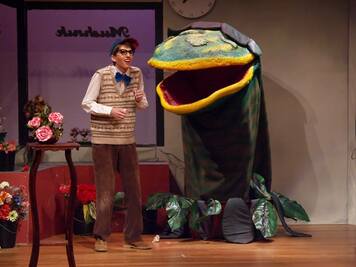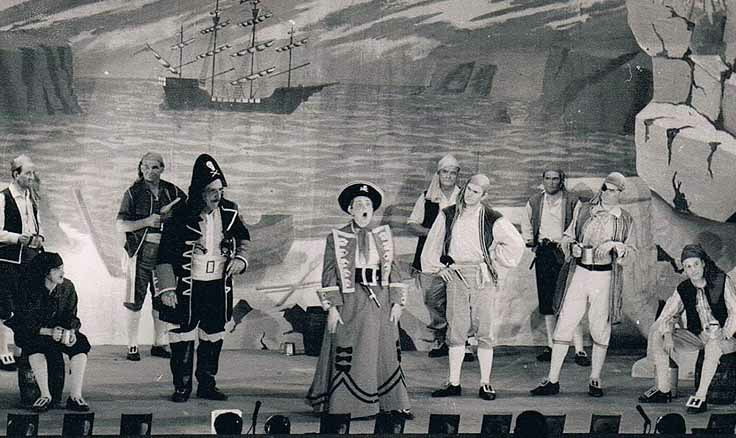| By Gill Heal FIFTY years. It’s a long time for an organisation to keep humming. Things change. You can’t get a quorum. Nobody’s excited anymore. What does it take for a community group to last 50 years? In the Wonthaggi Theatrical Group what stands out is its capacity to seek out or manage change. They’ve developed the habit of taking calculated risks. They square up to challenge. They say: “We can do that!” The theatre group‘s beginnings were inauspicious. In 1968 the State Coal Mine, life-blood of the town, had petered to a halt. Pessimists predicted the end of Wonthaggi. There was no strong tradition of theatre or music-making to call on. The arts were not big in Wonthaggi in 1968. Nevertheless, returning from a performance at Leongatha’s Lyric Theatre, enthusing about what they’d seen, a few Wonthaggi locals forgot that most of them had no theatrical experience and said: “We could do that!”. The Council of Adult Education lent them a director for their first few productions and encouraged them to ignore the doubters in their ranks. After that they were on their own. There was so much to learn. Voice projection. A whole new language: stage left, stage right, something called upstaging. The stage was floor level in the old Union Theatre. In one performance of their first show, “Pirates of Penzance” the pirates, with catlike tread, found themselves veering off into the audience. CAE director Eve Godley hissed from the wings: “Get back, bugger you, get back!” “What the group took on!” says Yvonne McRae. “And they got good performances! They were working with people who were completely untrained. I can remember Gwen Derrick banging away to the music with a piece of 2 by 4. ‘Left foot, right foot, left foot, kick!’ Bang, bang. ‘Listen to the beat!’ Bang, bang. They were dairy farmers, for God’s sake!” Keeping costumes in members’ homes, building sets in their own backyards, rehearsing wherever there was space, the group was desperate to have a home of its own. Rejoicing at their purchase of the decrepit Union Theatre, they wept at its loss by fire. Years later, acquiring their own green room, they were haunted by the spectre of bankruptcy. But the achievement was clear. “We laid a solid foundation,” says director and actor David Sims. “We established a performing group that had never existed before. We broke the barriers down.” And so on it goes: through the `70s, the `80s, the `90s, exhilaration, disappointment, creative endeavour, pressing on. “That was our greatest achievement: keeping on keeping on; keeping the group alive,” says life member Jenny Churchill. “Maybe it was to do with those of us who knew the history of the group, who felt we were part of something bigger, that we had a legacy that had been entrusted to us; there were those who’d gone before.” | Take a bow, Gill! Several members of the Wonthaggi Theatrical Group have had the privilege of being involved in Gill Heal’s brilliantly crafted oral histories. For performers, audience members and story-tellers alike the experience was deeply enriching as we connected and reflected on our own community and our place in the world. To have a writer of Gill’s calibre in our community is the gift that seems to endlessly keep giving. When we approached Gill to consider writing the WTG history using oral stories as the base and hence weaving our own narrative through “the players” we collectively held our breath. Each of us admires Gill greatly and have all been touched by her impact on the literary life of the broader community. When she accepted the (seemingly) overwhelming challenge to interview large numbers of people differing in ages, occupation and experience, combining that with poring over committee minutes and newspaper articles to determine the through-line and heartbeat of the group, it seemed the most generous and selfless gift we could imagine. Over the past three to four years Gill has worked tirelessly on this project, updating us at every stage and showing us endless drafts to ensure that the direction was in line with our original intent. What Gill has achieved is beyond our wildest imaginings. There is a central human factor from page 1 which continues all the way through to the end. You could never have heard of WTG and still enjoy this story from start to finish. We are in awe. We are grateful beyond what mere words can describe. Gill Heal – we salute you. - Karen Milkins-Hendry |
 In 2006, when WTG punted on a big-budget production of
In 2006, when WTG punted on a big-budget production of Little Shop of Horrors, it proved a turning point.
In 2006 the committee were persuaded to take a huge gamble and run with a little known musical, Little Shop of Horrors, and a budget of $25,000. It challenged everything they understood about fiscal responsibility but was the shot in the arm the group needed to haul itself into the 21st century.
Director Karen Milkins Hendry brought with her a desire to create a ”theatrical community”, people looking for an intense experience of camaraderie involving high levels of risk, hard work, commitment and skill.
They rented a cold and draughty factory which cost a lot but gave them the space to think big and an understanding of the conditions they would need to produce their best.
Their 2008 production of Les Miserables was nominated for three coveted Music Theatre Guild of Victoria awards. In just three years, they had become contenders.
Each year, with the focus of each major musical on the achievement of excellence, more people with different kinds of expertise were attracted to the group. Skill levels and production values grew exponentially. The excitement was contagious.
West Side Story, in 2009, threw out a challenge to the expanding pool of untrained, talented young people around the Bass Coast. They responded with a passion.
Working backstage, in the kind of family involvement that characterises the work of WTG, Malcolm and Jo Beasley saw their sons perform from the wings. “To be able to expose our kids to that comradeship, teamwork, discipline and sheer delight” says Malcolm, nine years later, “is an everlasting source of pride.”
The following year, Oliver introduced an even younger set of young people to a distinctive theatre culture. Some, young as they were, felt they had found their group, a place where they belonged.
The following years brought amazing advances in the group’s understanding of puppetry and technological applications involving collaboration between lighting, projection and stage management.
The focus now is not just on skill levels and technological know-how but on values like life-long learning and relationship building, with the business community, families and schools. And always, if the group is to grow and flourish, the need for good governance.
All this and a permanent home as well. They’ve come a long way from the cold and draughty shed they once rented. “The Shed”, their new home at the old State Mine, has a foyer and bar, an auditorium with seating for 150 and a two-level bio-box, a huge workshop, sewing rooms, a large wardrobe, a music room ... It’s the result of ridiculous amounts of voluntary labour over more than six years and the generosity of local tradesmen, schools, learning institutions and government funding.
It’s a place where “a young author with a rough script and some keen friends” might workshop his material, where he might be mentored by an older generation and find a willing audience.
What conditions ensure a community group will prosper?
One that knows that eternal youth is illusory and rancorous old age is poison. WTG is exploring a middle way. Happy 50th anniversary!
